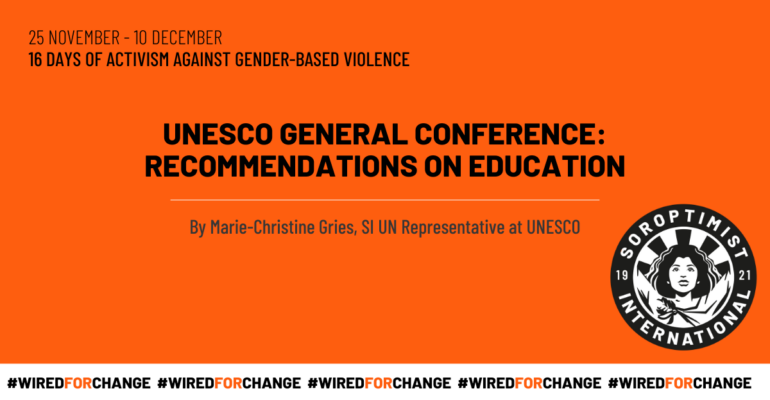Blog of Marie-Christine Gries, SI UN Representative at UNESCO.
Reporting on the important sessions held during the recent UNESCO General Conference, SI UN representative Marie-Christine Gries sheds light on how the currently evolving educational landscape contributes to our shared mission for a safer and more equitable world.
In response to global challenges such as this, the UNESCO General Conference’s transformative vision for education aligns with our currently ongoing 16 Days of Activism campaign, emphasising digital literacy as a tool for challenging gender-based abuse online.
The challenge: Achieving the SDGs by 2030
Sustainable Development Goal 4 (SDG4), Inclusive Education for All, seems a long way from being achieved by 2030. Noting the disastrous state of Education after the COVID crisis, and having received the work of expert commissions and the results of wide-ranging global consultations organied by UNESCO on the Future of Education, the Member States gave UNESCO a mandate in 2021 to submit to them at this 42nd session of the General Conference a revised 1974 Recommendation concerning Education for International Understanding, Cooperation and Peace and Education relating to Human Rights and Fundamental Freedoms.
-The title of the revised Recommendation has been significantly changed:
RECOMMENDATION ON EDUCATION FOR PEACE AND HUMAN RIGHTS, INTERNATIONAL UNDERSTANDING, COOPERATION, FUNDAMENTAL FREEDOMS, GLOBAL CITIZENSHIP AND SUSTAINABLE DEVELOPMENT
Changing mentalities through Education
The overhaul of the education system concerns all levels, including technical and vocational. It will not just apply to the knowledge to be imparted. It will tackle the forms and methods of transmitting knowledge and learning, and even their spatial and temporal context. It aims to bring about a fundamental change in mindsets, among both teachers and learners, and requires a considerable effort on the part of governments to implement their education policies, both materially and financially. Educational system must be able to face crisis and disasters to hold its mission under these circumstances.
Training teachers’ mind and qualification
The resolution insists on strengthening teacher training, professional development and challenging the shortage of qualified teachers. In particular, teachers must face up to the changes brought about by digital transformation and artificial intelligence. They must acquire the skills for Environmental education which must be strengthened.
The fight against stereotypes, discriminations and gender-based violence
Quality education that is equitable for all should promote inclusion, fight marginalisation, particularly of the most vulnerable, advance individual rights and gender equality, it should give learners the means to lead healthy lives and act as responsible citizens. This education includes age-appropriate sexuality education for all, based on scientifically accurate factual data to develop knowledge about reproductive health and the prevention of infections, as well as cognitive, social, emotional and behavioral skills to foster healthy, respectful and equitable relationships.
Moreover, as we navigate the complexities of the digital age, instilling digital literacy skills becomes paramount. Education in digital literacy empowers young individuals to navigate the online world safely, recognise potential dangers, and respond effectively to ensure their well-being in the digital realm. By equipping the youth with these essential skills, we contribute to building a safer and more respectful digital environment for future generations.
The capacity of learners to take their future in hand in a changing world
Education is becoming “transformative”: it must develop learners’ critical thinking skills, empower them, integrate culture and creativity, practice intersectoral cooperation as well as interdisciplinarity so that learning includes skills and knowledge appropriate to the evolutions of each individual, of society and of the labour market. Content should incorporate current technologies and STEM, encouraging women and girls to be invested in these disciplines.
As education adapts to the evolving landscape, its transformative nature becomes increasingly evident. Beyond the conventional role of imparting knowledge, education now stands as a powerful force in developing critical thinking skills, empowering learners, and fostering cultural understanding and creativity. In the midst of this transformation, technology emerges as a key player, holding the potential to reshape how we learn and engage with the world.
The emphasis on intersectoral cooperation and interdisciplinarity reinforces the idea that education should not exist in isolation but rather as a dynamic force interconnected with various facets of life. By encouraging collaboration between diverse fields, education equips learners with a holistic understanding of the world and the skills to address complex challenges. This interconnected approach also underscores the importance of ethical considerations in technological advancements, urging learners to actively contribute to a digital environment that upholds principles of equality, respect, and safety.
Lifelong learning for all
Lifelong learning opportunities must be available to all, combining formal, informal and non-formal learning in flexible pathways. Learners of all ages, women and men, must be equipped with digital skills and benefit from media and information literacy.
The Recommendation received a consensual approval by Member States
In order to implement the Recommendation, the States also voted on the missions of the various bodies’ dependent on UNESCO for their contributions to its application and a vote endorsed the presentation of a report by the Director-General of UNESCO on the effective application of the Resolution in 2024.
Following the approval of the Recommendation, the Assembly of States also approved the creation of two international days to be celebrated annually:
– 19 March: International Digital Learning Day
– 29 October: World Coding Day.
These days will undoubtedly serve as benchmarks for assessing positive developments in these sensitive technical fields.

